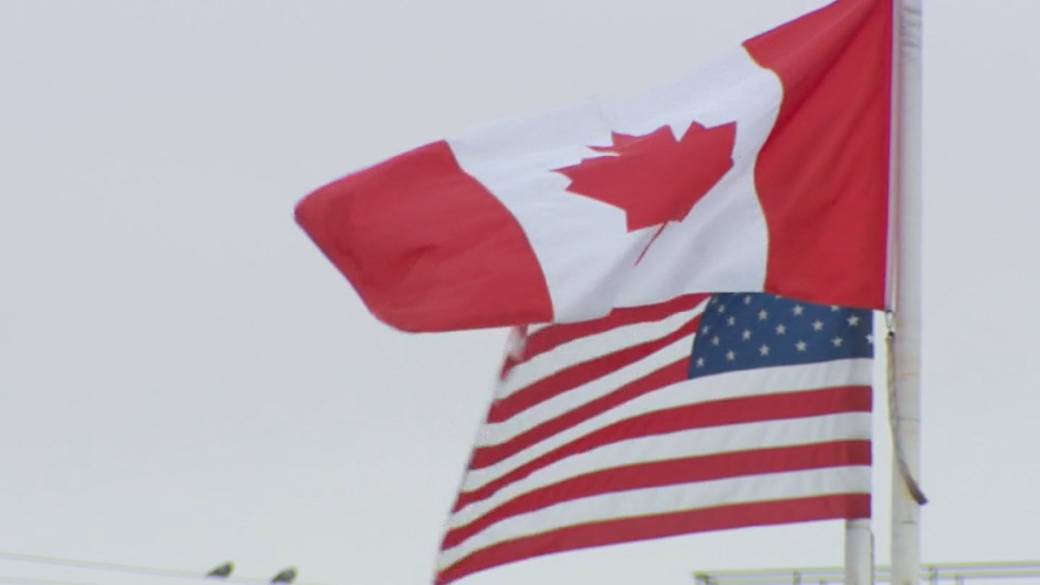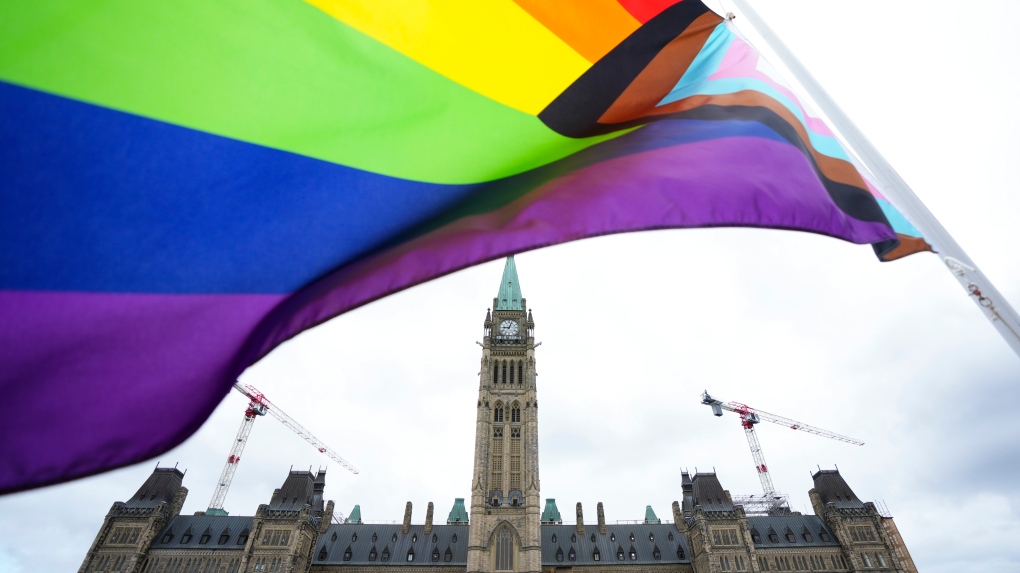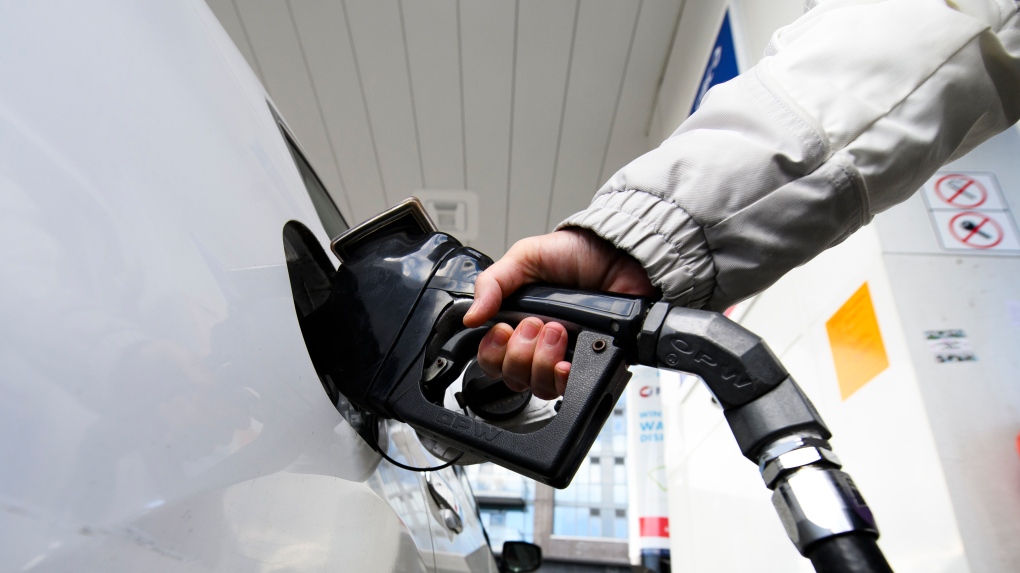News
Canadians’ view of U.S. drops to lowest level in nearly 2 decades

|
|
Donald Trump’s tenure in the White House and his handling of the COVID-19 pandemic have dragged Canadians’ view of the United States to its lowest level in nearly 20 years, a new poll suggests.
The Pew Research Center report released Tuesday finds a favourable view of the U.S. among only 35 per cent of Canadians surveyed, the lowest level recorded since Pew began polling north of the Canada-U.S. border in 2002.
“Like all countries surveyed this year, Canada’s favourable rating of the U.S. dropped sharply in 2017 as confidence in the U.S. president plummeted,” the centre said in a release.
“In the more than three years since Trump first took office, views have slowly shifted, but 2020 sees the lowest ratings for the U.S. in Canada since Pew Research Center began polling there almost two decades ago.”
The finding tracks an identical trend among all 13 countries involved in the poll — record lows were also recorded in the U.K., France, Germany, Japan and Australia.
Only 20 per cent of the poll’s 1,037 Canadian respondents expressed confidence in Trump himself, the lowest presidential rating Pew has ever recorded in Canada and a precipitous drop from the 83 per cent support for Barack Obama they found in 2016.
“In no country surveyed do more than a fifth think the U.S. has done at least a somewhat good job dealing with the virus, and a median of only 15 per cent across the 13 countries polled consider the country’s handling of the virus to be effective,” the centre said.
Out of the 83 per cent of Canadian participants unimpressed with the U.S. response, 57 per cent rated it as “very bad” and 26 per cent as “somewhat bad.”
“In every country surveyed, roughly eight-in-ten or more say the U.S. has handled the virus badly. And, in 11 of the 13 countries surveyed, half or more say the U.S. has done a very bad job dealing with the coronavirus outbreak.”
The Canadian portion of the poll was conducted by telephone between June 15 and July 27, and carries a margin of error of 3.7 percentage points, 19 times out of 20.
Pew acknowledged in the survey that the racial tensions and public fury over the police killing of George Floyd, whose death in May on a Minneapolis street with an officer’s knee on his neck triggered a tidal wave of outrage that washed over the world throughout the summer, could have affected the results as well.
The centre conducted a separate survey on 2020’s global reckoning on race during the same period it was gathering data on international impressions of the United States. That study examined how Black Lives Matter was reflected in the social media feeds of lawmakers and legislators in four countries, including Canada.
About 44 per cent of Canadian members of Parliament tweeted references to Floyd and Black Lives Matter during the period of the latest survey was conducted, the centre said.
“Concerns about racial injustice fit into a broader pattern of decline in the belief that the U.S. government respects the personal freedoms of its people.”
Source: – Global News
News
Best in Canada: Jets Beat Canucks to Finish Season as Top Canadian Club – The Hockey News
[unable to retrieve full-text content]
Best in Canada: Jets Beat Canucks to Finish Season as Top Canadian Club The Hockey News




Source link
News
Health Canada sperm donation rules changing for gay men – CTV News


Health Canada will change its longstanding policy restricting gay and bisexual men from donating to sperm banks in Canada, CTV News has learned.
The federal health agency has adopted a revised directive removing the ban on gay, bisexual and other men who have sex with men, effective May 8.
The policy change would remove the current donor screening criteria, allowing men who have sex with men to legally donate sperm for the first time in more than 30 years, as part of the anonymous donation process.
This update comes after CTV News first reported last year that a gay man was taking the federal government to court, challenging the constitutionality of the policy on the basis that it violates the right to equality in the Charter of Rights and Freedoms.
According to an email Health Canada sent stakeholders informing them of the upcoming amendments to the federal directive, “sperm donors will instead be asked gender-neutral, sexual behaviour-based donor screening questions,” more in-line with the 2022 change made by Canadian Blood Services to its donation policy.
However, instead of entirely eradicating restrictions for gay and bisexual men, lawyer Gregory Ko – whose client, Aziz M., brought the case – cautioned that Health Canada will continue to bar donations from those who have had new or multiple partners in the last three months, based on rules regarding anal sex. CTV News has agreed to protect the full identity of Aziz M. out of concerns for his privacy.
Ko said while the update is an important milestone, his client intends to maintain his challenge against the Health Canada directive, “and the continued discrimination contained in this latest revision.”
“Based on our understanding of the science, there is no scientific justification for screening criteria that continues to discriminate on the basis of sexual activity and sexual orientation, since the testing and quarantine protocols already in place allow sperm banks to detect relevant infections and exclude such donations,” Ko said.
Currently, a Health Canada directive prohibits gay and bisexual men from donating sperm to a sperm bank for general use, unless they’ve been abstinent for three months or are donating to someone they know.
For example, it stops any gay man who is sexually active from donating, even if they are in a long-term monogamous relationship.
Under the “Safety of Sperm and Ova Regulation,” sperm banks operating in Canada must deem these prospective donors “unsuitable,” despite all donations being subject to screening, testing and a six-month quarantine before they can be used.
While the directive does not mention transgender or non-binary donors, the policy also applies to individuals who may not identify as male but would be categorized as men under the directive.
It’s a blanket policy that the Toronto man bringing the lawsuit said made him feel like a “second-class citizen,” and goes to the heart of the many barriers that exist for LGBTQ2S+ Canadians looking to have children.
When CTV News first reported on the lawsuit, Health Canada and various federal ministers said they would be “exploring” a policy change, citing the progress made on blood donation rules.
The update comes following “the consultations held in August 2023 and January 2024,” according to Health Canada.
This is a breaking news story, more to come…
News
Gas prices: Why drivers in Eastern Canada could pay more – CTV News


Drivers in Eastern Canada could see big increases in gas prices because of various factors, especially the higher cost of the summer blend, industry analysts say.
Patrick De Haan, head of petroleum analysis at fuel savings website GasBuddy in Chicago, predicts a big gas hike for the eastern portions of Canada including Ontario, Quebec, Newfoundland and Labrador, New Brunswick and Nova Scotia over the next several days, while some areas in the Maritimes have already seen the increases.
“Unfortunately, for … really a third of Canada, we’re likely to see a big jump in what (motorists) are seeing at the pump,” he said in a video interview with CTVNews.ca. “Gas prices could rise in excess of 10 cents a litre. All of that having to do with yesterday’s switchover to summer gasoline.”
Gas prices may continue to increase for the next week or two, De Haan said. “But I think the end is near for the seasonal increases and we should start to see prices decreasing potentially by May (long weekend).”
Dan McTeague, president of Canadians for Affordable Energy, also forecasts gas price hikes.
Ontario and Quebec will see a 14-cent-per-litre increase overnight Thursday, he said on Wednesday. He predicts the price per litre will rise to $1.79 in cities across Ontario, the highest since Aug. 2, 2022. In Quebec, he expects the price per litre will increase to $1.88.
McTeague attributes this week’s increase to the higher cost of summer blended gasoline.
De Haan, meanwhile, observed the following changes in prices across Canada compared to a week ago:
- Prices in Saskatchewan are flat;
- Manitoba prices are up about a half a penny per litre;
- Alberta is down seven-tenths of a penny per litre;
- P.E.I. is up about 1.2 cents a litre;
- B.C. is up about 2.5 cents a litre;
- Nova Scotia is up three cents a litre;
- Quebec is up 3.5 cents a litre;
- Ontario is up 4.5 cents a litre;
- New Brunswick is up five cents a litre;
- Newfoundland is up seven cents a litre.
Factors behind spikes
“Some gas stations have already raised their price, in essence, but some others may not for the next day or two,” De Haan said. “So over the next several days, the averages will continue to rise as more stations raise their price. … Most of the increase is happening right now in the eastern portions of Canada.”
The summer gas switch will have “just a one-time impact” on gas prices, De Haan said.
More drivers are on the road, creating rising demand for gas as temperatures warm up, and refiners are wrapping up maintenance ahead of the start of the summer driving season. “While they do that maintenance, they’re generally not able to supply as much gasoline into the market,” De Haan explained.
Despite tensions between Iran and Israel, the recent attack has had “little impact” on the price of oil, De Haan said.
“Last week, oil prices did climb to their highest level (in) six months as Iran suggested it was going to attack Israel,” he said. “Now that those attacks have happened and they largely have been unsuccessful, the price of oil is actually declining.”
Third major spike in 2024
Michael Manjuris, professor and chair of global management studies at Toronto Metropolitan University, said the new gas price increase would be the third major spike across Canada since the start of the year.
One factor is the price of crude oil worldwide has risen 15 per cent since Jan. 1, Manjuris said.
The federal carbon tax increase of about 3.3 cents per litre on April 1 is also another reason for the big jolts in gas prices, he added.
Although the switch to summer blend fuels typically happens every year, Manjuris said, it will be more painful economically because it’s on top of the two other major increases this year. “This increase now will cause the overall price of gasoline to be very high,” he said in a video interview with CTVNews.ca. “We haven’t seen these kinds of prices since 2022.”
Manjuris believes gas prices will continue to rise through the summer as global demand for oil begins to grow. “That’s because we’re seeing increased economic activity in China, in the United States and in Europe,” he explained. “When those things all come together, price of crude oil starts to go up. … So I’m predicting that because of demand increasing, price of gasoline in Canada will also go up in the summer months. I’m going to suggest three to five cents a litre will be the peak before it starts to come back down.”
Regional differences
The West Coast and Prairies won’t have any gas price hikes coming soon because they already transitioned to summer gasoline, De Haan said. “So this is something associated with the switchover, which happens last in the eastern parts of Canada,” he explained.
In addition, he said regions have “subtle differences” in their supplies of gasoline.
“Supplies of winter gasoline in the eastern portions of Canada was rather lavish and so discounts were significant,” he said. “But now that the eastern part of Canada is rolling over to relatively tight supplies of summer gasoline, this is something much more impactful. That is other areas of Canada did roll over to summer gasoline, but they did not have necessarily the big discounts that would associate with the big price swing that we’re seeing.”
With files from CP24.com Journalist Codi Wilson
-



 Science10 hours ago
Science10 hours agoJeremy Hansen – The Canadian Encyclopedia
-



 Investment10 hours ago
Investment10 hours agoUK Mulls New Curbs on Outbound Investment Over Security Risks – BNN Bloomberg
-



 Tech9 hours ago
Tech9 hours agoSave $700 Off This 4K Projector at Amazon While You Still Can – CNET
-



 Tech8 hours ago
Tech8 hours ago'Kingdom Come: Deliverance II' Revealed In Epic New Trailer And It Looks Incredible – Forbes
-



 Sports8 hours ago
Sports8 hours agoAuston Matthews denied 70th goal as depleted Leafs lose last regular-season game – Toronto Sun
-



 Health23 hours ago
Health23 hours agoSupervised consumption sites urgently needed, says study – Sudbury.com
-
Real eState9 hours ago
Sick of Your Blue State? These Real Estate Agents Have Just the Place for You. – The New York Times
-
News23 hours ago
Canada's 2024 budget announces 'halal mortgages'. Here's what to know – National Post





